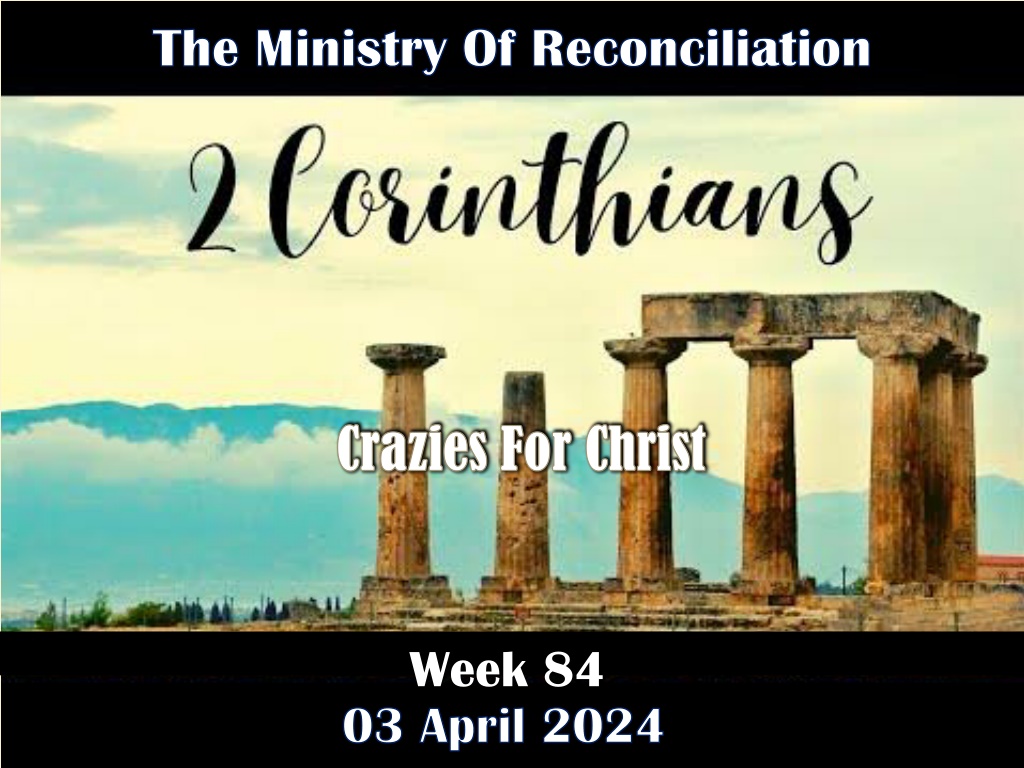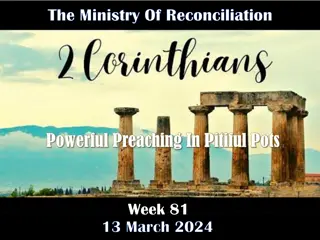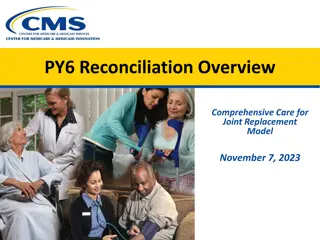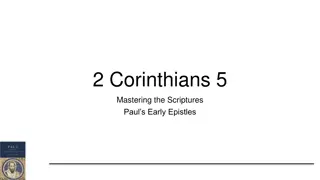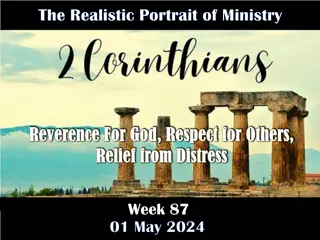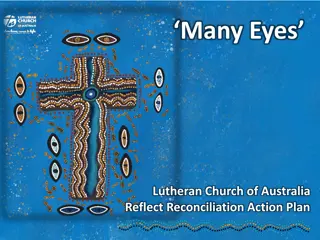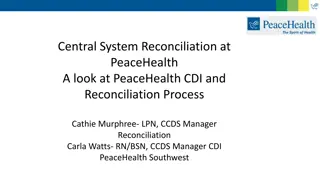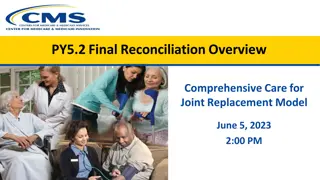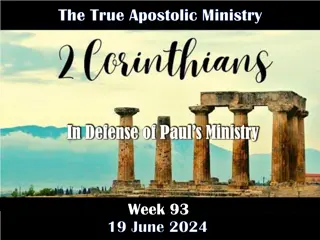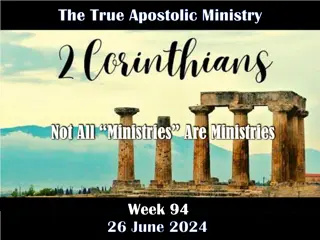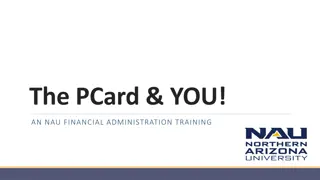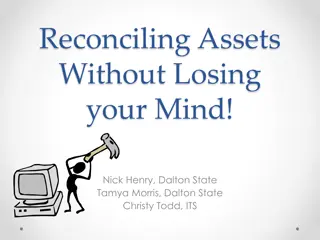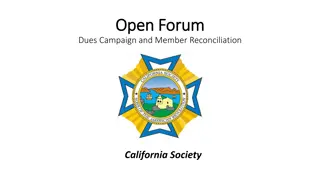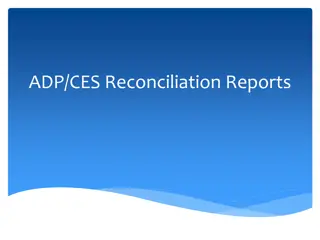Understanding the Ministry of Reconciliation in 2 Corinthians
This study delves into the themes of Second Corinthians, focusing on the theological concepts and practical aspects of Christian living. Paul emphasizes the transformative power of the Gospel, highlighting reconciliation, redemption, and the ministry entrusted to believers. Despite being perceived as strange or crazy by outsiders, mature Christians understand the depth of commitment to serving Christ, even mirroring how Jesus Himself was viewed in His time.
Download Presentation

Please find below an Image/Link to download the presentation.
The content on the website is provided AS IS for your information and personal use only. It may not be sold, licensed, or shared on other websites without obtaining consent from the author. Download presentation by click this link. If you encounter any issues during the download, it is possible that the publisher has removed the file from their server.
E N D
Presentation Transcript
The Ministry Of Reconciliation The Ministry Of Reconciliation Crazies For Christ Crazies For Christ Week 84 03 April 2024
2 CORINTHIANS INTRODUCTION In our continuing study of Second Corinthians, the themes of this letter revolves around both the theological concepts and the practical aspects of Christian living. The primary issue at Corinth was the recognition of authentic ministry and submission to apostolic authority. Paul s corrective was to provide guidance and encouragement as the church navigates the challenges that continue to influence their unity, discipline, and spiritual growth. In our study, Paul emphasizes the transformative power of the Gospel, highlighting themes of reconciliation, redemption, and the ministry of reconciliation entrusted to believers. Paul underscores the centrality of Christ's sacrificial death and resurrection, and urges believers to live for Him and proclaim the message of reconciliation faithfully to the world.
2 CORINTHIANS - LESSON OVERVIEW Swindoll . . . opens our study by highlighting how Christians are often perceived by those outside our faith. He says . . . I ll admit it. Sometimes we Christians get a little crazy, at least from the perspective of outsiders. Frankly, if I were outside the faith, I d think Christians are completely off their rockers too. If you live in a Bible bubble, you may have forgotten how other people view us. But all you have to do is turn on the morning news during a political segment to be reminded. We are not reasonable, according to secular standards. We are too conservative, too dogmatic, and too intolerant. We believe strange things, speak a strange lingo, and have strange practices.
2 CORINTHIANS - LESSON OVERVIEW Though our beliefs and practices used to be regarded as mainstream in Western society, now we are considered to be barely hanging on to the fringes. A. W. Tozer says . . . A real Christian is an odd anyway. He feels supreme love for One whom he has never seen, talks familiarly every day to Someone he cannot see, expects to go to heaven on the virtue of Another, empties himself in order to be full, admits he is wrong so he can be declared right, goes down in order to get up, is strongest when he is weakest, richest when he is poorest, and happiest when he feels worst. He dies so he can live, forsakes in order to have, gives away so he can keep, sees the invisible, hears the in audible, and knows that which passes knowledge. Yes! We may appear to be a little strange.
2 CORINTHIANS - LESSON OVERVIEW But that is not only the mark of a good Christian; that the mark of a strong Christian. The more mature you grow in an all-out commitment to serve Christ, the stranger you appear to those disinterested in the things of Christ. In fact, we crazy Christians are in good company. Even Christianity s founder was considered insane by those around Him. The multitudes said that Jesus had lost His senses and was possessed (Mark 3:21-22). Others said He had a demon and was insane (John10:20). So we shouldn t feel surprised if we, His followers, are regarded with the same contempt.
2 CORINTHIANS - LESSON OVERVIEW After hearing Paul s testimony concerning his conversion and his Christian convictions as an ambassador of Christ, the Roman governor of Judea, Festus Porcius told the apostle that he was out of his mind . . . And as he thus spake for himself, Festus said with a loud voice, Paul, thou art beside thyself; much learning doth make thee mad (Acts 26:24). Hebrews 11:36-38 records how other radical servants of the Lord were mocked, scourged, chained, stoned and even imprisoned because they were Christians. The world thinks we are crazy. That s okay! In fact, if nobody thinks you are a little out of step with the culture because of your Christian faith, something may be wrong with your walk.
2 CORINTHIANS - LESSON OVERVIEW Your faith ought to raise eyebrows at times. People in your office ought to look over their desk and say, you said what? And your neighbors may very well ask if you are serious. However, when unbelievers notice the stark contrast between what they believe and what you believe, this becomes a platform for your testimony. Written from the context of v10, about the believers judgment, from vs. 11 21, Paul explains how we are to live as believers by explaining his own behavior.
2 CORINTHIANS - LESSON OVERVIEW From this passage, Paul highlights fourreasons why Christians are so misunderstood by those outside the faith: 1) Our mission is unique (5:11-13). 2) Our approach is different (5:14-16). 3) Our life is transformed (5:17-19). 4) Our role is unusual (5:20-21).
2 CORINTHIANS 5:11-13 11Knowing, therefore, the terror of the Lord, we persuade men; but we are well known to God, and I also trust are well known in your consciences. 12For we do not commend ourselves again to you, but give you opportunity to boast on our behalf, that you may have an answer for those who boast in appearance and not in heart. 13For if we are beside ourselves, it is for God; or if we are of sound mind, it is for you.
2 CORINTHIANS 5:11-13 Our Mission is Unique (5:11-13) We live in an age where personal choice reigns supreme. Most people think each individual has every right to choose to live any they desire: Married or divorced, homosexual or heterosexual, religious or secular. So long as they do not harm anybody physically and directly, we are told we should accept people as God made them, tolerate their decisions, and stop trying to make them feel guilty or change their minds. Paul had a different take on the believers responsibility. Whereas everybody else has the prerogative to leave people to the errors of their ways, our mission is unique. We have a responsibility to share the truth with others.
2 CORINTHIANS 5:11-13 Instead of tacitly accepting others beliefs and actions in an I m okay, you re okay fashion, the looming reality of the judgment seat of Christ motivates us to persuade men to accept Christ (5:11). The word persuade used here, is the Greek word peitho (pi'-tho) meaning to convince, to prevail upon, or to win over. Paul s means of persuasion were not through force, shame, deception, or theatrics, but by intelligent reasoning from the Scriptures (Acts 18:4; 28:23). In other words, our fervent belief that Jesus alone is the Way, the Truth and the Life (John 14:6) motivates us to a ministry of persuasion.
2 CORINTHIANS 5:11-13 Trying to reason with people, convincing them through biblical revelation that Jesus is the Christ and their only hope of eternal life. This does not mean becoming obnoxious in the process. But, like Paul, we may go to great lengths to win a hearing with people from all walks of life (1Cor. 9:19-22). Paul clarifies that he was not trying to impress the Corinthians by his radical evangelistic lifestyle (5:12). Rather, he wanted to simply present the facts so when his adversaries in Corinth bad-mouthed him and his fellow apostles, his defenders could speak on his behalf. His opponents took pride in appearance rather than in sincerity of heart.
2 CORINTHIANS 5:11-13 Paul, on the other hand, didn t seek the approval of the masses. He says, If we are beside ourselves, it is for God (5:13). The phrase beside ourselves is the same phrase found in Mark 3:21, when Jesus family feared he had lost his mind. However, the Corinthians should have known that Paul wasn t crazy. After all, he had used reason and persuasion to convince them of the soundness of the gospel. The charge that Paul was insane came not from fellow believers but from false teachers and those outside of the faith.
2 CORINTHIANS 5:14-16 14For the love of Christ compels us, because we judge thus: that if One died for all, then all died; 15and He died for all, that those who live should live no longer for themselves, but for Him who died for them and rose again. 16Therefore, from now on, we regard no one according to the flesh. Even though we have known Christ according to the flesh, yet now we know Him thus no longer.
2 CORINTHIANS 5:14-16 Our Approach is Different (5:14-16) We have an internalized, compelling force that controls us the love of Christ (5:14). Most people have nothing of the kind, no driving passion in life, no overarching purpose or plan for the decisions they make and the priorities they set. They do whatever seems expedient or pleasurable, living for the momentary, self-serving interests. Christ s love for us and ours for Him now defines our lives. In the grip of this love, our outlook on the world changes. Threethemes determine our choices and our paths . . .
2 CORINTHIANS 5:14-16 First that Jesus died for all (5:14). Second that since all people are dead spiritually, they all need someone Jesus to give them new life. Third that once we have given Him our lives, we no longer desire to live for ourselves but for Him (5:15). When we align our trajectory with these threemarkers, our approach to life will differ completely from the world. Unlike the world s positive we are all good people approach, we view all people including ourselves as essentially bad apartfrom divine grace. At the same time, we view all people as savable becauseof divine grace.
2 CORINTHIANS 5:14-16 This is what Paul means when he says, We recognize no one according to the flesh (5:16). Just as we once regarded Jesus as other men, according to the flesh, once we accept that he is the God-man who died and rose again on our behalf (5:15). Our whole outlook changes and we view people as sinners who can be saved by the gospel of Jesus. This radically alters our perspective: we now view our own purpose in life as Christ-centered in response to divine grace.
2 CORINTHIANS 5:17-19 17Therefore, if anyone is in Christ, he is a new creation; old things have passed away; behold, all things have become new. 18Now all things are of God, who has reconciled us to Himself through Jesus Christ, and has given us the ministry of reconciliation,19that is, that God was in Christ reconciling the world to Himself, not imputing their trespasses to them, and has committed to us the word of reconciliation.
2 CORINTHIANS 5:17-19 Our Life is Transformed (5:17-19) Believers in Christ have not just turned over a new leaf. They have not simply managed to carry out a New Year s resolution past February. Nor have they been brainwashed into some kind of cultish lifestyle in which their every move is determined by some guru on high. Rather, they are truly changed from within transformed! Therefore if anyone is in Christ, he is a new creation; old things passed away; behold, new things have come (5:17). Most people don t realize that Paul alluding to a very important passage, Isaiah 65:17, For behold, I create new heavens and a new earth; and the former things will not be remembered or come to mind.
2 CORINTHIANS 5:17-19 The Isaiah text refers specifically to the renewal of creation that will come about after Christ returns and perfects this world, cleaning it from its wickedness and radically restoring and surpassing its original intention. Peter writes, According to His promise we are looking for new heavens and a new earth, in which righteousness dwells (2Peter 3:13). In Rev. 21 22, we catch a marvelous glimpse of this new condition. In 5:17, Paul applies this imagery to the redeemed believers, indicating the radical, dramatic transformation that God designed to take place when a believer says I do to Jesus Christ.
2 CORINTHIANS 5:17-19 When Christ invades a life, He performs a miraculous act of re-creation, analogous to the extreme overhaul of creation itself that He will perform at the Second Coming. He brings into being something new. When this new life is born in us by the work of the Holy Spirit, we will be transformed from the inside out, changing our priorities, our relationships and our actions. Only God can do this work in us, but once He has done the work, we then participate in living out the inner workings of this new life (Phil. 2:12-13). The first obvious sign of our transformed life is to fulfill our ministries of reconciliation (5:18-19).
2 CORINTHIANS 5:17-19 God has commissioned each of us to show others that Jesus death on the cross paid for our sin, appeased God s wrath and brought about forgiveness. Jesus resurrection from the dead opened us up to a new life in relationship with Him through the powerful indwelling Spirit of the resurrection (Rom. 8:11). To us, who have personally experienced this reconciliation with God, Christ has committed the message of reconciliation that is, the gospel of the person and work of Jesus Christ (5:19).
2 CORINTHIANS 5:20-21 20Now then, we are ambassadors for Christ, as though God were pleading through us: we implore you on Christ s behalf, be reconciled to God. 21For He made Him who knew no sin to be sin for us, that we might become the righteousness of God in Him.
2 CORINTHIANS 5:20-21 Our Role is unusual (5:20-21) As representatives of Christ s righteous rule, we speak a different language, we have different customs and lifestyles. We appear a bit like foreigners in a foreign land. We are ambassadors for a nation without borders, an invisible kingdom without currency, a King whose throne is in heaven and who reigns spiritually through the hearts of His people. One day He will establish His kingdom on this earth, and what was unseen will be made visible; but until that day, we have an unusual role to play as ambassadors of an invisible empire (5:20). Ambassadors represent their homeland and its messages, promoting its policies to the people among whom they live.
2 CORINTHIANS 5:20-21 Their country is often judged by their actions as their deeds are watched and their words scrutinized. The same is true of us. Our true home is in heaven; our true sovereign is the Lord Jesus Christ. As ambassadors, we represent King Jesus to those around us, even though they may not acknowledge Him as their own sovereign Lord. Of our role as ambassadors: R. V. G. Tasker says, Ambassadors engaged upon human affairs are chosen especially for their tact, their dignity and their courtesy, and because they are gifted with persuasive powers. The ambassadors for Christ should show the same characteristics. They must never try to bludgeon men and women into the kingdom of God, but must speak the truth in love . . . by the gentleness and meekness of Christ.
2 CORINTHIANS 5:20-21 Our task as ambassadors is simple: to beg others on behalf of Christ to be reconciled to God (5:20). The simple content of this message of reconciliation is succinctly stated: He made Him who knew no sin to be sin on our behalf, so that we might become the righteousness of God in Him (5:21). This verse is the heart and soul of the saving power of the gospel. Jesus , the perfect God-man, the spotless Lamb of God, was made a sin offering in our place, just as Isaiah had prophesied centuries earlies: Yet it pleased the Lord to bruise him; he hath put him to grief: when thou shalt make his soul an offering for sin . . . (Isaiah 53:10).
2 CORINTHIANS 5:20-21 Through faith alone in the person and work of Jesus Christ, we become the righteousness of God. A real transfer occurs at the Cross: we trade our guilt for His innocence. Having been declared righteous (justified), we are completely free of guilt and shame and have become full heirs of a glorious promise. Is that crazy talk? Maybe. But wouldn t you rather be a fool for Christ s coming kingdom than wise in a world that is passing away?
APPLICATIONS OF THE LESSON How Can Crazies Like Us Be Effective?
APPLICATION HOW CAN CRAZIES BE EFFECTIVE? Swindoll closes by reminding us that we can still be effective in a world that sometimes thinks we are crazy. He says . . . Unless you ve been hiding in the wilderness for the last couple of decades, you ve probably noticed that the world s gone crazy. If you turn on the television or surf the web, many of our politicians, and media personalities make it look like authentic Christians (Crazies) are the ones who have lost their minds when we refuse to call good evil and evil good. So, in a world that s lost its way, can we crazies be effective in authenticallyand accurately representing Christ in both word and deed?
APPLICATION HOW CAN CRAZIES BE EFFECTIVE? Here are a threethings we can do to continue to be effective in ministry. FIRST we maintain our mission. Because the fear of the Lord guides our steps, we need to keep on pleading with this world that is off its rocker. We need to persuade them to consider the claims of Christ as Savior and Lord. We need to appeal to them to be reconciled to the creator God they ve shut out or shunned. We can t afford to lose sight of our mission. SECOND we keep our perspective. It s easy to look at our message concerning Christ s death and resurrection and believe it has no relevance to the world today.
APPLICATION HOW CAN CRAZIES BE EFFECTIVE? In the cacophony of entertainment, politics, and businesses, it may feel like our little voice telling the old, old story just can t be heard. Nonsense! As ambassadors of Christ, we need to remember that God s booming voice speaks through our most timid whispers. It s God s Word that does the work. Verse 5:16 says, we should no longer regard anyone according to outward appearance. Because one day the flashiest rock star, the most crooked politician, and the worldliest tycoon will bow down to the crucified and risen Lord. Remember, our message has the power to bring them to their knees today, before it s too late.
APPLICATION HOW CAN CRAZIES BE EFFECTIVE? THIRD we fulfill our role as ambassadors. We don t speak on our own behalf, but on Christ s. It isn t our message that we convey, but His gospel. We don t invite people to our church, but into His body. We don t build up our little kingdom, but His. Ambassadors who represent rulers of this world speak with their authority. If they had to stand on their own power and authority, they would collapse. In the same way, God is making His appeal to the world through us as ambassadors of Christ (5:20).
APPLICATION HOW CAN CRAZIES BE EFFECTIVE? Therefore, we can stand in bold confidence when we open our mouths to share His good news and live our lives in a way that flies in the face of this world. When people look at you funny for holding quaint or even crazy ideas about God, Christ and holy living, don t fret. Maintain your mission, keep your perspective. Fulfill your role as an Ambassador of Christ.
NEXT CLASS 10 April 2024 Before next class, read the below chapters in Before next class, read the below chapters in the KJV and in one other versions of the Bible, the KJV and in one other versions of the Bible, i.e., NIV, NRSV, TLB, CEV, etc i.e., NIV, NRSV, TLB, CEV, etc Chapter 6:1 10 The Brutal Realities of Ministry
